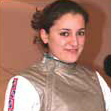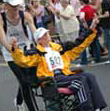2.5 What's this got to do with sport?
So, we've seen three ways of looking at the how the body works. This is useful science but what has this to do with sport? Do athletes really need to think about their bodies scientifically, or can they just get on and compete in their own sport?
Yes, athletes (or someone in their support team) really do have to think about their bodies in these ways. One obvious example is that athletes have to know what happens when they eat before a competition.
Listen to what our fencer and runner have to say on this subject.

Transcript: Audio 1

Transcript: Audio 2
Different foods have different values for the body, and elite athletes have to know the most appropriate food. Also the body takes much longer to digest some foods than others – for example, beef takes many hours to digest – so athletes have to know about this to choose what food to eat just before a competition.
Another example is that athletes have to know how their muscles work. A high jumper uses different muscles to a long jumper, and so their training regimes are likely to be very different. An athlete who follows a scientific approach that identifies the particular muscle groups which are important and ensures that they work efficiently is likely to perform better than one who follows a more traditional training schedule which doesn't place as much emphasis on a scientific approach.
